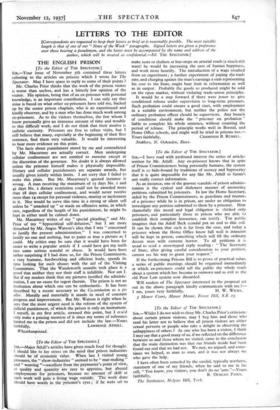LETTERS TO THE EDITOR
[Correspondents are requested to keep their letters as brief as is reasonably possible. The most suitable length is that of one of our " News of the Week " paragraphs. Signed letters are given a preference over those bearing a pseudonym, and the latter must be accompanied by the name and address of the author, which will be treated as confidential,—Ed. THE SPECTATOR.] THE ENGLISH PRISON [To the Editor of THE SPECTATOR.] Sra,—Your issue of November 5th contained three letters referring to the articles on prisons which I wrote for The Spectator. May I hive space to reply to some of their points ?
Mr. Charles Prior thinks that the work of the prison visitor is worse than useless, and has a bitterly lbw opinion of the visitor. His opinion, being that of an ex-prisoner with personal knowledge, is an important contribution: I can only say that Mine is based on what other ex-prisonets have, told me, backed up by the senior prison chaplain; who is an experienced and kindly observer, and by a man who has done much work among ex-prisoners. As to the visitors themselves, the few whom I know personally -give an immense amount of time and trouble to this difficult work, and I do not think that their motive Is sadistic curiosity. Prisoners are free to refuse visits, but I still believe that many, 'especially at the beginning of their first sentence, find them very valuable. It would be interesting to hear more evidence on this point.
The facts about punishment stated by me and contradicted by Mr. Macartney are actually correct. Men undergoing cellular confinement are not entitled to exercise except at the discretion of the governor. No doubt it is always allowed unless the prisoner himself makes it physically impossible. Dietary and cellular punishments are separate awards, but usually given jointly within limits. I am sorry that I failed to make this plain. But Mr. Macartney's quoted instance is wrong. A man receiving the maximum of 15 days No. .1 and. 42 dayis No. 2 dietary restriction could- not be awarded more than 28 days cellular confinement, and would never receive more than 14 except for perSonal violence, mutiny or incitement to it. Nor would he serve this time in a strong or silent cell unless he " Smashed up " or Made an offensive noise, in which case, regardless of the length of his punishment, he might be kept in either until he Calmed down. Mr. Macattney writes of my " special pleading," and Mr. Prior of my " hypoeritical self-delusion," but I am more diSturbed by Mr: Angus Watson's idea that I-Was " concerned to justify the present administration." I was concerned to justify no one and nothing, but to paint as true a picture as I could. My critics may be sure that it would have been far easier to write a popular article if I could haVe got my teeth into some serious scandal or abuse. It -would have been rather surprising if I had done so, for the Prison Commission, a very humane, hardworking and efficient body, spends its time looking for such abuses with the aid of the Visiting CommitteeS. That the ,WandsWorth assaults took place is a proof that neither they nor. their staff infallible. Nor am I. But if my readers think that my pictures justified the adminis- tration, I see no cause for regret therein. The prison is not an institution about which one can be enthusiastic. It has been: described by, a recent secretary to the , Commission as a pis oiler. Morally and materially it stands in need of constant progress and improvement. But. Mr. Watson is right when he says that the most urgent need is the reform of the system of judicial punishment, of which the prison is only an instrument. I myself, in my first article, stressed this point,, but I ccu'.4 only make a passing mention of it since my terms of reference limited me to the prison and did not include the law.—Yours














































 Previous page
Previous page